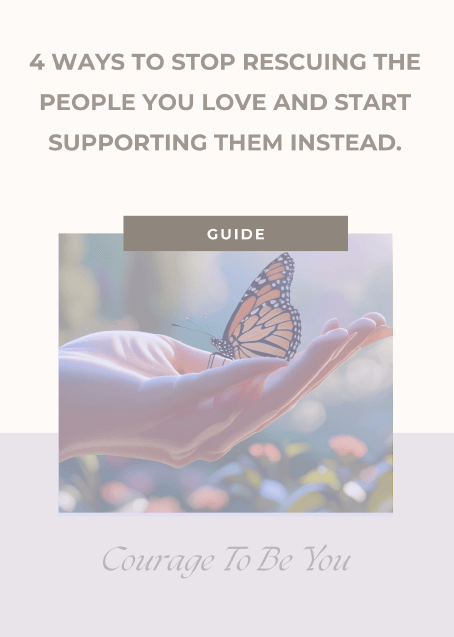
How To Stop Rescuing The People You Love And Start Supporting Them Instead
Do you find yourself taking responsibility for other people's happiness? It could be a partner, friend, family member, or even a colleague. It's not at all uncommon to feel driven to please others in order to earn acceptance and approval. It's something that many of us learn in childhood when there's a good reason to want to please others and earn their approval.
The problem is that we often carry this 'need to please' into adult life. It shows up as a tendency to rush in and rescue people because that makes us feel wanted and needed and not guilty.
As I mention in my book, How Kind People Get Tough most of us genuinely want to be kind and considerate to others. We like to help, and there’s nothing wrong with that. However we can blur the lines between offering support to someone and outright rescuing them.
A lot of people find themselves drifting into the rescuer role. It may be with one particular person, or type of person, or it may be with everyone. Typical examples may be a family member who wants a lot of your time, an adult child who’s always asking for money, a demanding teenager, or a partner who just can’t seem to manage daily tasks without your help. Maybe you recognise one of these situations, or similar in your own life?
We all deserve to have our own time and space, and to be happy in life. If you keep sacrificing your time and energy, neglecting your own needs, and leaving little room to have the life you want for yourself, that's not helpful.
Rescuing Tends To Lead To Resentment
When you find yourself shouldering the responsibility for someone else's problems and constantly coming to their rescue, you may start to feel taken for granted. The more you give and sacrifice, the more you’ll create a sense of imbalance and inequality in your relationship. Over time, you may well start to feel resentment because you feel taken for granted and neglected.
Resentment is a sneaky energy. A lot of the time we don't even recognise it's there. It hovers under the surface and causes us to behave in ways that don't help, such as making barbed comments, or pushing people away one minute and being overly there for them the next.
Ultimately you can't hide resentment because human beings tend to pick up on subtle signals that we give to each other. So the other person will pick up on your resentment - you'll both end up feeling disempowered and unhappy.
The answer to all this is to get very clear on the difference between rescuing and supporting. If you realise that you’ve been rescuing someone, move into a more supportive role. Doing so will lead you to be happier and calmer in yourself, the other person will become more self-reliant and your relationship will become stronger and closer.
How to Tell if You're Being a Rescuer
To support someone means empowering them whilst holding true to your own sense of self-worth, that is remembering that your needs count as well as theirs. This starts with setting good boundaries.
When you support someone you’re letting them know that you care and that you're right there by their side. But you’re also encouraging them to take steps to help themselves. In this way they don't feel alone in their problem, but they’re also being gently encouraged, and so they gain confidence in their own abilities.
On the other hand, to rescue someone means you’re taking responsibility for them, regardless of your own needs. It doesn't help the other person to grow and gain their own confidence. In fact it also takes a toll on your own confidence as you start to feel stressed and overwhelmed by the pressure to fix things for them.
You can identify if you've been rescuing people by looking at the following list. Do any of these seem familiar to you?
I can’t relax if someone else is unhappy.
I never have enough time and I feel resentful about that.
I’m taking all the responsibility to make a relationship work.
I find it difficult to say no.
I feel guilty if I say no or don't help.
I feel like I’m being taken for granted.
how to break the role of rescuer
We all want to be there for the people we care about. The trick is to learn how to be better at supporting them more, and rescuing them less.

To help you, I've created a useful guide on 4 Ways To Stop Rescuing The People You Love And Start Supporting Them Instead.
Based on helping thousands of clients in therapy, this guide outlines 4 effective steps you can take straight away.
In the guide you’ll find specific things to do, or not do, so that you can help others be more self-reliant, yet still be there for them in loving and kind ways.



